
Background information
Henry Halfhead: Swiss game with a good head on its shoulders
by Philipp Rüegg
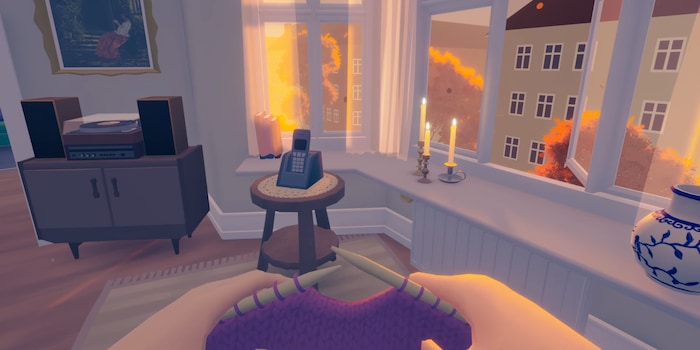
As Long As You’re Here isn’t your typical video game, but a walking simulator. It doesn’t offer an escape from reality. Instead, it confronts you with it – emotional, crushing and strangely healing.
Annie can’t remember. She can’t remember the last words she said to her brother before he travelled to Europe years ago, leaving her behind with their ill father.
So begins As Long As You’re Here – a game about forgetting and remembering that gets under your skin.
I’ve never played anything like As Long As You’re Here. It lasts only about an hour, and the developers recommend you play it in one go. I agree. The way it immerses you in Annie’s world as her Alzheimer’s becomes more apparent is remarkable.
As Annie, you stand at a bus stop in the rain, trapped in memories of your late brother Christoffer. You read your last conversation as lines of text suddenly vanish – a brilliant trick to simulate your fading, fragmented memory.
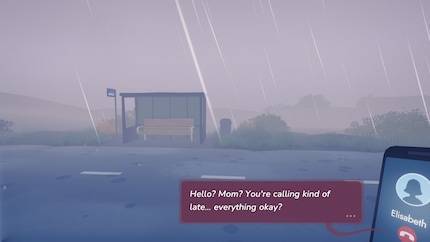
You don’t know where you are and call your daughter Elisabeth. She takes you back to your apartment, where the rest of the game unfolds. You’ve just moved here, into the same building as Elisabeth, so she’s only a few stairs away if you need her.
The game strikingly shows how things slowly slip away. Day after day, you try to focus on small tasks: making coffee, watering plants, taking medication. Sticky notes left by Elisabeth help along the way.
Forgetfulness creeps in – and the game conveys it masterfully. The coffee cup is no longer where you left it. Some days you forget to take your pills, made obvious by the leftover tablets in the pillbox. Your family comes over for dinner, and you don’t even realise they’re there.
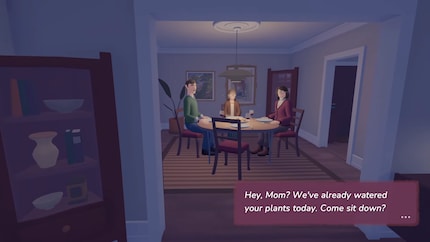
The pacing is fast, with cleverly used time jumps: before going to bed, the trees are still golden; in the morning, snow suddenly covers the ground outside your window. You have no idea what happened in between, yet you feel the weight of every moment as life passes you by.
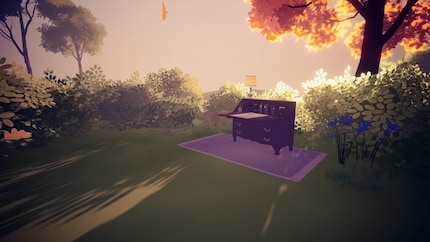
The game plays tricks on you. Rooms suddenly look different, as if you were in your old home. It feels like you’re in a horror game. Only eerie music is missing. The soundtrack is occasionally dark and supports the game’s atmosphere perfectly. But it’s a different kind of horror than what I know from traditional titles like Karma: The Dark World.
The game does a phenomenal job portraying the perspective of someone with advancing dementia. Doctors give you tasks such as drawing a family tree to remember your loved ones. Each section of the game corresponds to a family member you add – a brilliant storytelling device.

Along the way, you unravel the story of your brother and his journey through Europe. It’s told in haunting fragments – like an old postcard you find while unpacking moving boxes.
You witness how the process strains your family. Tensions rise between your children, Elisabeth and Peter. They argue about care and finances. It offers an authentic glimpse into living with dementia – and not just from Annie’s perspective.
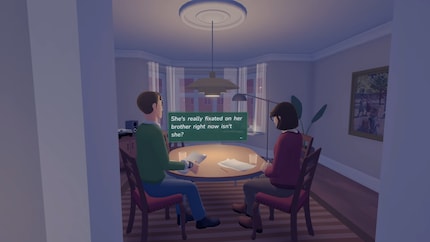
Some of these aspects could have been explored more deeply. They remain side notes – which makes sense, since you’re seeing the world through Annie’s eyes. Still, there are powerful moments with secondary characters, such as when you mistake Peter for Christoffer or spend time with your grandson Noah. You get the feeling Annie no longer knows exactly who he is – yet you brush the thought aside. It’s a moment Noah will remember forever.
As Long As You’re Here is heavy fare, but it’s handled with great sensitivity. The visuals and gameplay are simple, as is typical for walking simulators. But anyone willing to engage with the characters, the theme of dementia and the story will experience something truly unique. The game moved me deeply. It’s a powerful, meaningful must-play for anyone touched by the subject – and for everyone else too.
As Long As You’re Here has been available for PC since 29 October. I bought the game myself.
From big data to big brother, Cyborgs to Sci-Fi. All aspects of technology and society fascinate me.
Interesting facts about products, behind-the-scenes looks at manufacturers and deep-dives on interesting people.
Show all
Background information
by Philipp Rüegg

Background information
by Domagoj Belancic

Background information
by Cassie Mammone